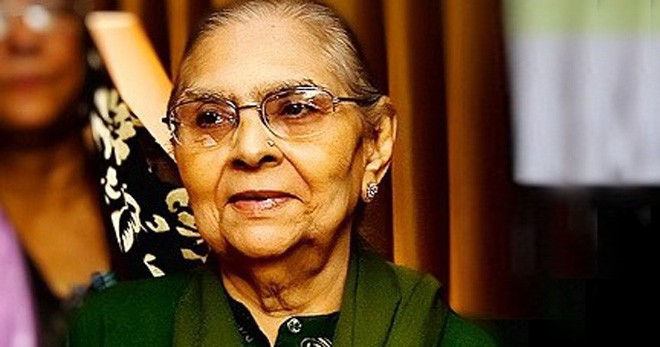
A trailblazer, Anita Ghulam Ali’s courage and biting wit will remain an inspiration

She leaves a void that will be hard to fill, but her legacy will live on through the institutions she was associated with, and the people she mentored over the decades, particularly in the field of education. Although Anita Ghulam Ali had no children of her own, many of these individuals were as dear to her as if they were her own. She took a keen interest in their work and personal wellbeing, in the most non-interfering way, encouraging, questioning, supporting, and motivating. She would ask affectionately, with genuine concern, after their children and grandchildren, whom she’d seen grow from babies to "young ladies" or gentlemen, as she would put it.
It didn’t matter if you were a chaprasi or a CEO. With Anita Ghulam Ali, you could be assured of the same treatment, rooted in egalitarianism and respect for human dignity.
I can’t remember a time when she was not part of our lives. Heading the West Pakistan Teachers College Association (WPTCA), she had led the massive teachers’ strike in the late 1960s that my mother Zakia Sarwar participated in as a young lecturer at Sir Syed Girls College in Nazimabad, Karachi. They were demanding that private colleges, which had proliferated during the military regime of Ayub Khan, pay due wages to their teachers.
As many as 72 private colleges ungoverned by rules or regulations had cropped up in Karachi alone, compared to ten government colleges. The exploitative owners would make teachers sign for salaries listed as double of their actual pay, or make them perform menial tasks at their homes. Insults and harassment were common. The last straw was when anti-Ayub agitations closed down educational institutes for nearly five months, and private college owners stopped paying their teachers salaries. Some teachers resorted to operating pushcarts on the streets, vending clothes and other items to feed their families.
I visualise Anita Ghulam Ali as she must have been then, a short, stocky figure, hair pulled back severely from her broad forehead, intensely bright, dark, slightly slanted eyes over wide, high cheekbones -- the Slavic beauty inherited from her equally formidable and regal Georgian mother Shirin, a respected social worker.
The authorities, wanting the teachers to end their agitation, tried to get Anita’s father Justice Feroz Nana Ghulam Ali, to step in. A police officer went to tell him that his daughter was creating trouble and could be arrested.
"If she is breaking the law, by all means arrest her," Justice Nana is reported to have replied calmly.
Anita Ghulam Ali remained true to her parents’ legacy, uncompromisingly honest and committed to humanitarian values all her life. A prominent leader in the field of education, she served as Sindh’s Education Minister in October 1996 and as a caretaker minister in November 1999. Some criticised her for having accepted a position under the military dictator Gen. Pervez Musharraf.
"I don’t care who appoints me, a dictator or a democrat. I just want to get the job done," she told me.
A trailblazer in the field of education, leadership, and social activism, her courage, biting wit and will of steel, will remain an inspiration -- not to mention her refusal to suffer fools. For over two decades she headed the pioneering Sindh Education Foundation, fending off corrupt ministers and bureaucrats who felt entitled to a share of the funds she raised. She would share stories of how she got the better of them, although there were setbacks too.
One minister had even eyed her paintings and ingratiatingly, but blatantly, asked her for them. She recalled the incident sardonically, relating how she had refused the man, telling him off in her own unique way -- low-key, direct, firm, yet with a touch of irony and wry humour. She had nothing but contempt for such parasites, but she knew how to work with them, earning their respect, and getting what she needed.
Her pioneering adopt-a-school programme is now replicated in all provinces. A vocal opponent of child labour, she also initiated community-supported schools for underprivileged, working children in Karachi. These are places where working children can come in, be mentored, given education, get cleaned up, and receive medical care including vaccinations. As always, she had a pragmatic approach to the issue, recognising that these children work because they must, either as sole breadwinners for their families or to supplement the family income significantly.
A recklessly driven car crashed into her as she stood by the roadside many years ago, leaving her with long-term injuries that eventually confined her to a wheelchair. Additionally, she also suffered from debilitating arthritis. But Anita Ghulam Ali refused to let anything get in the way of her work. She obtained permission from her apartment authorities to get a small lift installed for her top-floor apartment. Later she courageously stood firm against the land developers who wanted to raze the building and build a multi-storey (illegal) structure there. Had it not been for her, the builders would have had their way long ago.
Anita Ghulam Ali received several awards, from the government - including the President’s Pride of Performance medal and the Sitara-e-Imtiaz -- as well as from various private organisations. But the down-to-earth, unpretentious, totally unmaterialistic person that she was, for her, the real recognition came from the genuine love and respect she received from those whose lives she touched.